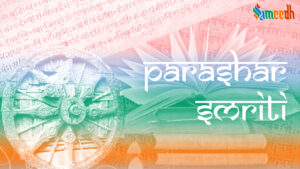The Parashara Smriti is an ancient Hindu legal and ethical text attributed to the sage Parashara. Like other smritis, it belongs to the genre of Dharm Shastras, which provide guidelines for righteous living, social order, and ethical conduct. Parashara Smriti is traditionally considered a significant text that addresses various aspects of life, law, and morality.

The Parashara Smriti is an ancient Hindu legal and ethical text attributed to the sage Parashara. As with many ancient Indian texts, establishing a precise origin and dating for the Parashara Smriti is challenging due to the lack of historical records and the oral tradition through which these texts were transmitted for many centuries before being written down.
Estimates for the composition of the Parashara Smriti generally place it between the 2nd century BCE and the 2nd century CE, based on linguistic, historical, and cultural analysis. However, these dates are approximations, and the actual timeframe of its composition remains uncertain.
The Parashara Smriti is traditionally attributed to Sage Parashara, who is also associated with other important texts in Hindu tradition, including the Vishnu Puran and the Parashara Hora Shastra (an astrological text). Sage Parashara is revered for his wisdom and contributions to various fields of knowledge.
Here are some general teachings associated with the Parashara Smriti:
- Dharma (Righteous Duty): The Parashara Smriti emphasizes the concept of dharma, guiding individuals on their righteous duties based on their varna (caste) and ashrams (stage of life). It provides guidelines for ethical living in accordance with one’s role in society.
- Varna and Ashrama Dharma: The text outlines the duties and responsibilities associated with the four varnas (Brahmins, Kshatriyas, Vaishyas, and Shudras) and the four ashramas (Brahmacharya, Grihastha, Vanaprastha, and Sannyasa). Each stage of life is expected to fulfill specific duties.
- Family and Marriage: Parashara Smriti addresses the institution of marriage, detailing the rituals, responsibilities of spouses, and rules regarding inheritance. It provides guidance on family life and the ethical conduct of householders.
- Legal Principles: The text contains laws and legal principles governing various aspects of society, including property, contracts, and crimes. It contributes to the understanding of justice administration and the maintenance of social order.
- Penance and Atonement: Similar to other smritis, the Parashara Smriti discusses the concept of penance (prayaschitta) and atonement for individuals who have committed sins or transgressed social and moral norms. It prescribes procedures for purification.
- Philosophical Insights: Beyond practical guidelines, the Parashara Smriti offers philosophical insights into concepts such as karma (action), dharma, and the pursuit of spiritual knowledge. It may touch upon the philosophical underpinnings of righteous living.
- Social Ethics: The text provides guidance on ethical conduct in various aspects of life, including professional engagements and social interactions. It emphasizes honesty, integrity, and fairness.
- Duties of Kings and Administrators: Like other smritis, the Parashara Smriti addresses the duties of kings and administrators. It outlines principles for just governance and the protection of the welfare of the citizens.
It’s important to note that interpretations of the Parashara Smriti, like other smritis, can vary, and different schools of thought within Hinduism may emphasize different aspects of its teachings. Additionally, the practical application of these teachings has evolved over time as societal norms and values have changed.